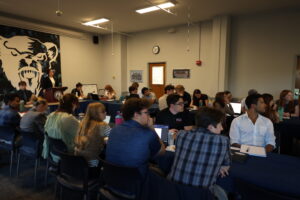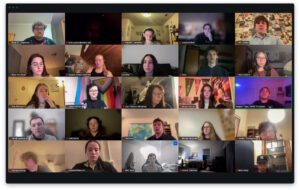On Oct. 14, the Maine Center for Economic Policy (MECEP) released a new report titled “Sovereignty Starts Here: Land, Economy, and Tribal Rights in Maine,” which explores how generations of land loss and limits on tribal sovereignty have shaped the economic and social conditions of the Wabanaki nations. The report argues that strengthening tribal self-governance would help address historical injustices while creating shared economic benefits for communities across the state.
Published during Indigenous Peoples’ Month, the report has sparked renewed conversation about Maine’s relationship with the Wabanaki nations and the role of land in building a more equitable future. MECEP researchers emphasize that economic justice and sovereignty are closely connected and that when Wabanaki nations are able to thrive, Maine’s broader economy and society benefit as well.
In a recent Instagram post, The Wabanaki Alliance expressed support for the report’s publication.
“The Wabanaki Alliance is proud to uplift this report as it outlines how sovereignty for the Wabanaki nations benefits us all here in what we now call Maine. MECEP highlights the economic benefits of sovereignty for our people, the history of land theft and its impact on the Wabanaki nations, and so much more.”
James Myall, author of the MECEP report, shared a key takeaway that he wants University of Maine students to know.
“This will help all of us. This is not just a case of benefiting those folks. We can start by taking a look at some of the issues like recognizing the importance of sovereignty in general, and then some small steps the state could be taking,” said Myall.
Past actions enabled Maine to profit for nearly two centuries from land that was taken, resold and developed, while Wabanaki communities were denied any share of those gains. When the Maine Indian Claims Settlement Act (MISCA) was established in 1980, the state did not provide financial contributions and later claimed the power to interpret the agreement’s terms, further restricting tribal sovereignty. The report notes that this history remains poorly understood and urges both state and federal leaders to take meaningful steps toward addressing those longstanding injustices.
Karin Leuth, who represents MECEP within the Wabanaki Alliance, shared her perspective on the Settlement Act of 1980.
“Most Mainers don’t realize that Maine didn’t contribute anything financially to the settlement (MICSA). There was not nearly enough funding to buy back a small part of that land, even disputed. Maine just got away with all of that profit and kept all of the land. It is fundamentally unfair and we need to make sure people know that Maine and the Congress can, and should be doing more to make amends for that,” said Leuth.
She continues to say that by publishing the report, MECEP “wanted to make sure that people know that this is not just a history lesson.”
“People need to understand that the 1980 settlement act changed things for the Wabanaki nation. A lot of people don’t understand what led up to it,” said Leuth.
The conversation around land and sovereignty in Maine continues to grow. MECEP’s report urges Mainers to reckon with a past that many feel has too often been overlooked and to consider what a fair and respectful relationship with the Wabanaki nations could look like today. Many see this moment as a chance for the state to move from acknowledgment to meaningful change, recognizing that the future of Maine is tied to justice and sovereignty for its Indigenous communities.
MECEP will be holding a ‘Lunch and Learn’ webinar about the report via Zoom on November 5 at noon. You can find more information and details on the events page through the MECEP website.












